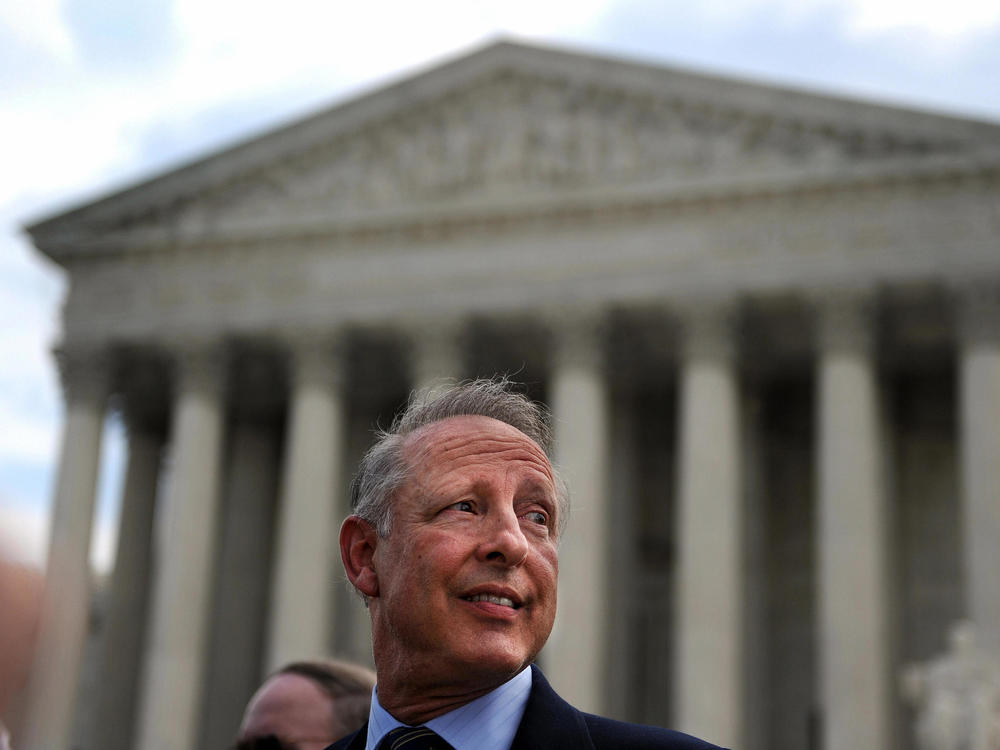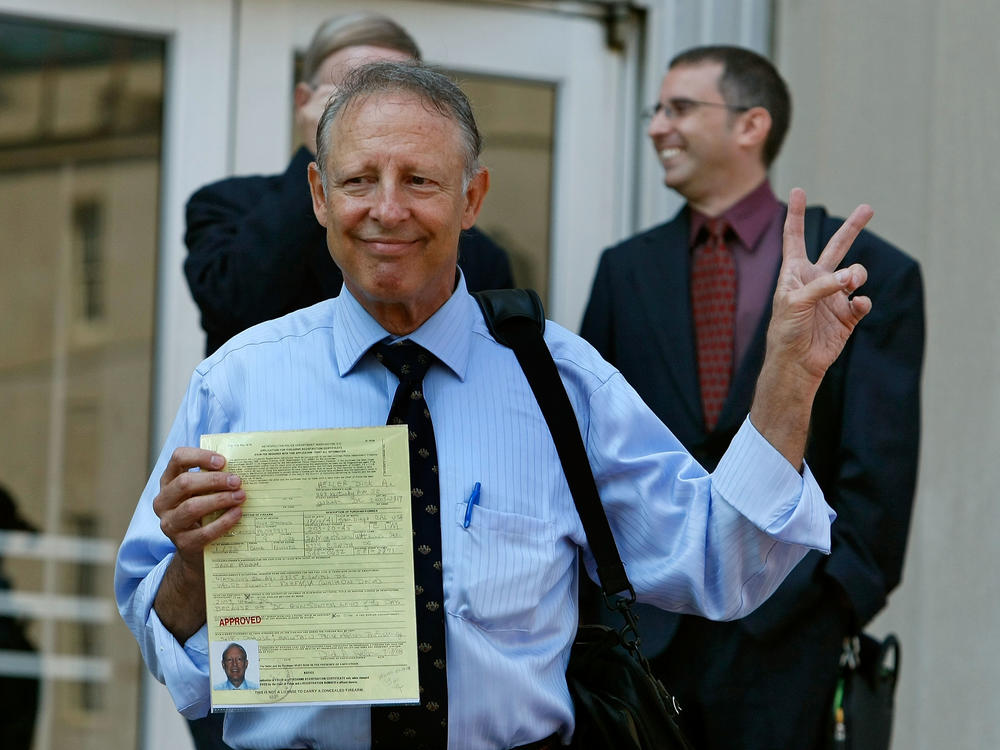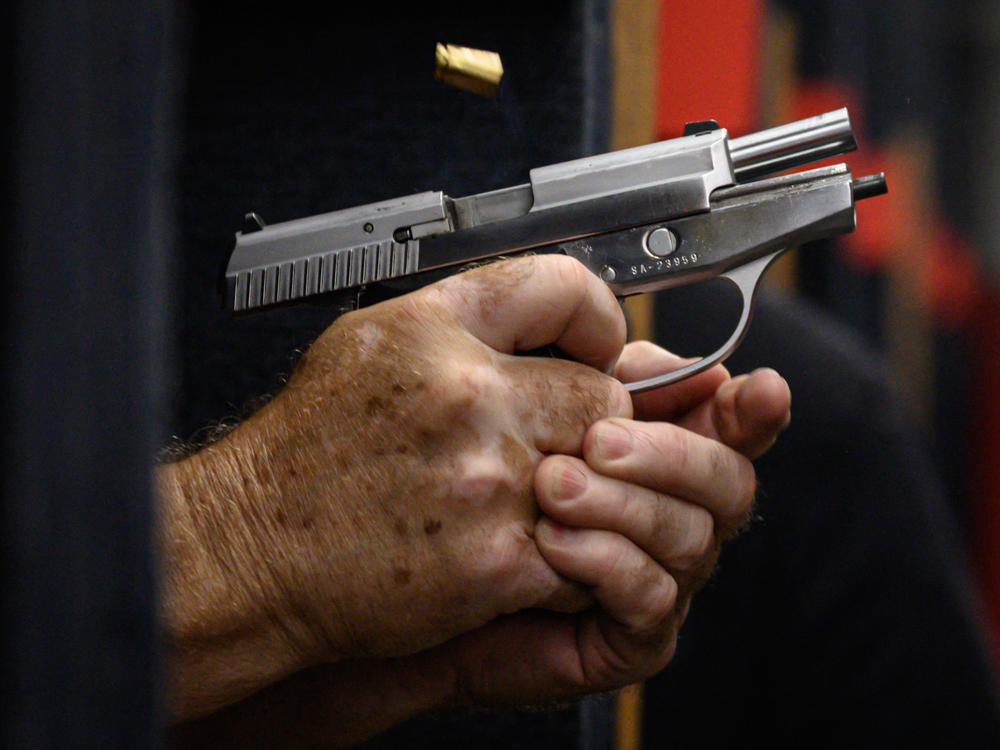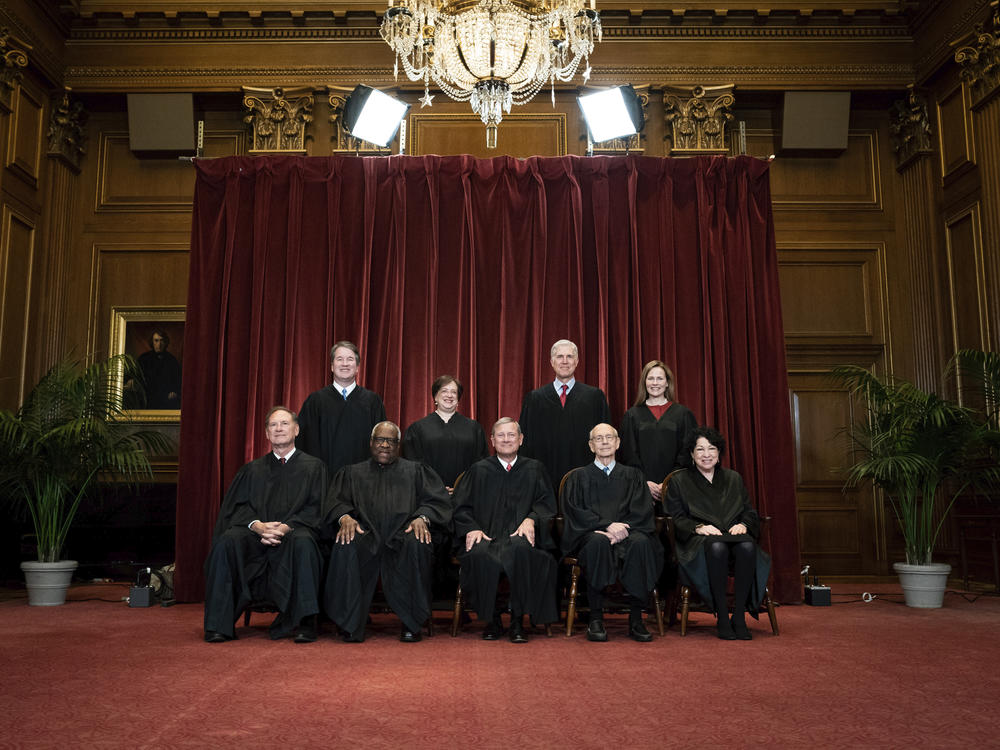Section Branding
Header Content
The 'Gun Dude' and a Supreme Court case that changed who can own firearms in the U.S.
Primary Content
Dick Heller would like to be known as the "Gun Dude."
For the self-described octogenarian who still works as a special police officer in the federal prison system, it's a moniker that acknowledges the key role he has played in how the Second Amendment is interpreted today.
An individual right to own a gun for personal protection is an idea that is deeply rooted in American culture. But for most of U.S. history, there was little actual legal framework to support any such interpretation of the Second Amendment. It wasn't until a relatively recent Supreme Court decision that this all changed.
Heller was at the center of it. In 2003, he was one of six individuals who sued the District of Columbia over its restrictive gun laws and won. As the case made its way through the courts, Heller became the sole plaintiff.
The Second Amendment states that "A well regulated Militia, being necessary to the security of a free State, the right of the people to keep and bear Arms, shall not be infringed."
While Heller may not be a household name, the case that bears his name redefined gun ownership, as it marked the first time the Supreme Court affirmed an individual right to gun ownership that was separate from the "militia clause" in the Second Amendment.
"The Heller case is clearly one of the most important Second Amendment cases in American history, if not the most important," says Adam Winkler, a professor at the UCLA School of Law.
Darrell Miller, a professor of law at Duke University who has written extensively on gun-rights issues, simply calls it "a watershed."
Heller has been involved in gun-rights advocacy ever since, including an ongoing debate in Washington, D.C., where he lives, over "ghost guns" — homemade polymer guns that don't contain a serial number.
And a line can be traced from the Supreme Court's 2008 Heller decision to the high court's recent ruling in New York State Rifle & Pistol Association Inc. v. Bruen. That 6-3 decision reinforced the previous stance in Heller, holding that a New York state law that required a person to "demonstrate a special need for self-protection" in order to carry a gun outside the home was unconstitutional. The majority opinion said that the law violated the 14th Amendment by "preventing law-abiding citizens with ordinary self-defense needs from exercising their Second Amendment right to keep and bear arms in public."
The lawsuit was two decades in the making
Heller says his "figurative gunfight" started in 1976, when he purchased a firearm in Maryland — a revolver with a "sculptured grip" that was "a work of art" — and brought it back to D.C., where he lived and worked as a local police officer.
Three months later, the District passed a law making it a crime to carry unregistered firearms and prohibiting the registration of handguns — effectively banning them. It required other firearms to be stored unloaded or locked.
"In the capital of the freest country on the planet ... you could not own a firearm," Heller says.
For the next 20 years, he basically stewed about the restrictions. Eventually, Heller found his way to the libertarian CATO Institute, and a court challenge to the D.C. law began to take shape.
Writing for the majority in the 5-4 decision, Justice Antonin Scalia, now deceased, said that the Second Amendment "protects an individual right to possess a firearm unconnected with service in a militia, and to use that arm for traditionally lawful purposes, such as self-defense within the home."
Referring to the so-called militia clause, Scalia added that it "announces a purpose, but does not limit or expand the scope" of individual ownership.
Duke University's Miller says that Justice Scalia's opinion was "essentially reaching back and saying those 200 years of history where it's all about the militia clause, those are all wrong."
"So now, you don't have to show that you're a member of the National Guard to have a pistol in your home for purposes of self-defense," he says.
Prior to Heller, "you didn't have any kind of federal Second Amendment rights that were unrelated to one's membership in a militia," Miller says.
"There was pretty consistent agreement among courts, and really scholars," says Alex McCourt, director of legal research at the Center for Gun Violence Solutions at the Johns Hopkins Bloomberg School of Public Health. They believed, he said, "that the Second Amendment did not confer an individual right."
McCourt, who studies firearms policy, says the 2008 decision was the first time that the Supreme Court recognized the individual right over the collective rights theory, as embraced by the older view of the militia clause that had previously prevailed.
To be sure, long before the Heller case, the NRA and other gun-rights advocates had pushed the idea that the Second Amendment conferred just such an individual right. It's a view that former Chief Justice Warren Burger, speaking in a 1991 interview, forcefully rebuffed, calling it "one of the greatest pieces of fraud, I repeat the word fraud, on the American public by special interest groups that I have ever seen in my lifetime."
To understand what an important departure the Heller case was, you need to step back to a 1934 case involving bank robbers and a sawed-off shotgun. In United States v. Miller, Jack Miller and Frank Layton were charged with violating the National Firearms Act (NFA) of 1934 by transporting the weapon across state lines. The Supreme Court, in a unanimous decision with eight justices presiding, affirmed the charges against the two men. The high court overturned a lower court ruling dismissing the case against the two men on the grounds that the NFA violates the Second Amendment.
In essence, the Supreme Court said, "this case just doesn't give rise to a Second Amendment problem at all because the sawed-off shotgun has no relationship to a well-regulated militia," says Eric Ruben, an assistant professor at Southern Methodist University Dedman School of Law and a fellow at the Brennan Center for Justice.
"Most people if they're anti-guns, they say ... the militia, that's the National Guard," says Heller, who rejects that notion. "Everybody understands the phrase 'shall not be infringed' ... It means what it says."
The Heller case underscores the challenge facing gun-control advocates
Scalia's opinion opened the door to eliminating some public carry regulations and bans, but it did not immediately strike down many longstanding prohibitions on firearms. Ruben says that the vast majority of challenges to gun regulations in years subsequent to Heller actually failed.
UCLA's Winkler, who specializes in constitutional law, agrees with that assessment. The reason, he says, is that "America does not have very strict gun laws to strike down."
"Even in states like California or New York that have the strictest gun laws in the nation, the laws are very permissive," he says. "So there aren't that many really restrictive laws to strike down in the name of the Second Amendment."
Although Second Amendment cases since Heller have been rare, the increasingly conservative Supreme Court has signaled a much fuller embrace of individual gun rights.
Winkler is among the legal scholars who see this summer's Bruen case on a par with the 2008 Heller decision.
The Bruen decision, he says, "expands Heller considerably" by extending the federal right to bear arms outside the home and extending it "to the public streets."
In it, the Supreme Court also "articulated a new test for courts to apply in Second Amendment challenges, and that test is going to be harder for state and local governments to meet in trying to defend their gun laws," Winkler says.
Heller says gun laws should be even more relaxed
Heller says he's still not satisfied with the state of gun rights in the U.S. Stand-Your-Ground laws in nearly two dozen states, for example, have too many loopholes, he says. And he fears the gains made nearly 15 years ago in the case that bears his name, and in more recent cases like Bruen, could still be reversed.
One imagined scenario that concerns him is a future constitutional convention that could threaten the Second Amendment, he says.
"Freedom and justice are the operative words here," Heller says. "Fifty years from now, things could change."
Copyright 2022 NPR. To see more, visit https://www.npr.org.




